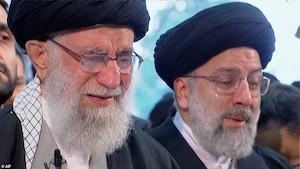Iran votes in presidential election tipped in hardliner's favor
Israel Hayom
June 16, 2021
Ebrahim Raisi (right) with Supreme Leader Ayatollah Ali Khamenei
Iran began voting Friday in a presidential election tipped in the favor of a hard-line protege of Supreme Leader Ayatollah Ali Khamenei, fueling public apathy and sparking calls for a boycott in the Islamic Republic.
State-linked opinion polling and analysts put hard-line judiciary chief Ebrahim Raisi, appointed by Khamenei to the position in 2019, as the dominant front-runner in a field of just four candidates. Former Central Bank chief Abdolnasser Hemmati is running as the race's moderate candidate but has not inspired the same support as outgoing President Hassan Rouhani, who is term-limited from seeking office again.
If elected, Raisi would be the first serving Iranian president sanctioned by the US government before even entering office over his involvement in the mass execution of political prisoners in 1988 and the suppression of unrest in 2009, as well as his time as the head of Iran's internationally criticized judiciary – one of the world's top executioners.
It also would firmly put hardliners in control across the Iranian government as negotiations in Vienna continue over trying to save Tehran's tattered nuclear deal with world powers as it enriches uranium to the closest point yet to weapons-grade levels.
The mid-ranking cleric says he backs Iran's talks with six major powers to revive the nuclear deal, under which Iran agreed to curbs on its nuclear program in return for the lifting of sanctions.
Raisi, who shares Khamenei's suspicion of detente with the West, says only a powerful government can implement any revival of the pact.
Polls opened at 7 a.m. local time for the vote, which has seen widespread public apathy after a panel under Khamenei barred hundreds of candidates, including reformists and those aligned with Rouhani. Khamenei cast the ceremonial vote from Tehran, where he urged the public to take part.
"Through the participation of the people the country and the Islamic governing system will win great points in the international arena, but the ones who benefit first are the people themselves," Khamenei said. "Go ahead, choose, and vote."
There are more than 59 million eligible voters in Iran, a nation home to over 80 million people. However, the state-linked Iranian Student Polling Agency has estimated a turnout of just 42%, which would be the lowest since the country's 1979 Islamic Revolution.
Fears of a low turnout have some warning Iran may be turning away from being an Islamic Republic – a government with elected civilian leadership overseen by a supreme leader from its Shiite clergy – to a country more tightly governed by its supreme leader. As supreme leader, Khamenei has the final say on all matters of state and oversees its defense and atomic program.
Under pressure over rising inflation and joblessness, the clerical leadership needs a high vote count to boost its legitimacy, damaged after a series of protests against poverty and political restrictions across Iran since 2017.
Raisi has crucial backing from Iran's Revolutionary Guards Corps, a powerful institution which over the years has opposed reformist initiatives, overseen the suppression of protests, and used proxy forces to assert Iran's regional influence.
"This is not acceptable," said former President Mohammad Khatami, a reformist who sought to change its theocracy from the inside during his eight years in office. "How would this conform to being a republic or Islamic?"
For his part, Khamenei warned of "foreign plots" seeking to depress turnout in a speech Wednesday. A flyer handed out Wednesday on the streets of Tehran by hardliners followed in that thought, bearing the image of Revolutionary Guard Gen. Qassem Soleimani, who was killed in a US drone strike in 2020.
"If we do not vote: Sanctions will be heavier, the US and Israel will be encouraged to attack Iran," the leaflet warned. "Iran will be under the shadow of a Syrian-style civil war and the ground will be ready for the assassination of scientists and important figures."
State television also aired footage of a polling station set up by Soleimani's grave in the city of Kerman. Poll workers also wore gloves and masks due to the coronavirus pandemic, with some wiping down ballot boxes with disinfectants.
Yet the disqualification of candidates seemed aimed at preventing anyone other than Raisi from winning the election, as Khatami did in 1997 by surprisingly beating a hardliner favored by Khamenei. That in addition to public anger with Rouhani, whose signature 2015 nuclear deal collapsed after then-President Donald Trump unilaterally withdrew America from the accord in 2018. Iran's already ailing economy has suffered since, with double-digit inflation and mass unemployment.
The vote "is set to be the least competitive election in the Islamic Republic's history," wrote Torbjorn Soltvedt, an analyst at risk consultancy firm Verisk Maplecroft. "The election is heavily stacked in favor of candidates from the theocratic and hard-line end of Iran's political spectrum; there will be little need for the more overt forms of election fraud that characterized the turbulent re-election of Mahmoud Ahmadinejad in 2009."
The decision to limit participation comes as whoever wins likely will serve two four-year terms as nearly every Iranian president has since the revolution. That means they may be at the helm at what could be one of the most crucial moments for the country in decades — the death of the 82-year-old Khamenei.
Already, speculation has mounted that Raisi may be a contender for the position, as well as Khamenei's son, Mojtaba, who is believed to have close ties to Iran's paramilitary Revolutionary Guard.

No comments:
Post a Comment